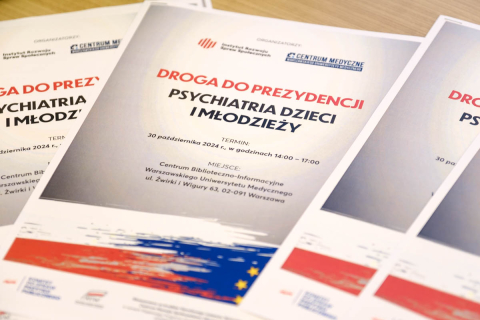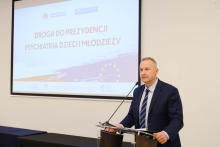The topic of child and adolescent psychiatry was discussed by experts in the context of the Polish Presidency in the Council of the European Union, which will begin on January 1, 2025. This area could become one of the priorities of the presidency, as was emphasized by representatives of the Ministry of Health at previous IRSS conferences. As noted by Małgorzata Bogusz, President of IRSS, Member of the European Economic and Social Committee (EESC), the discussion of the priority on mental health of children and adolescents has already appeared during previous presidencies of the Council of the European Union.
- The issue of child and adolescent mental health was marked as important by the previous trio of member states. One of the priorities of the Spanish presidency in early 2023 was child and adolescent psychiatry, while the Belgians referred to mental health in the workplace. After the COVID-19 pandemic, we need to pay particular attention to adequate mental health care for children and adolescents to ensure their long-term health and mental well-being.
The scale of the problem is growing
At the beginning of the conference, Prof. Marcin Sobczak, Vice Rector for Science and Technology Transfer MUW, pointed out that the scale of the problem related to mental health assistance for the youngest patients is growing.
- We've had an increase in our youngest patients awaiting professional care, but we haven't had an increase in specialists. On the one hand, we have a huge demand to take care of our young patients, on the other: the number of specialists is unfortunately still insufficient.
Prof. Bolesław Samoliński, Head of the Department of Public and Environmental Health and the Department of Prevention of Environmental Hazard, Allergology and Immunology MUW, chairman of the Subteam for Priorities in the Area of Health of the Polish Presidency in the Council of the EU in 2011, stressed that the health care system is facing a sudden increase in demand for mental health assistance.
- Something like this has not yet been experienced by humanity, that the problems affecting children, adolescents and adults in the sphere of mutual communication and psychological well-being are growing so rapidly, exponentially. These are extremely disturbing phenomena.
Research on young people
Justyna Mieszalska, President of the Medical Center of the Medical University of Warsaw, in her speech cited data indicating that the mental state of Polish youth is alarming.
- A survey conducted by the Office of the Children's Ombudsman shows that only six out of ten children consider their lives joyful. Young people are also not satisfied with their lives, and even say they never feel satisfied or feel so very rarely.
Dr. Aleksandra Lewandowska, National Consultant in Child and Adolescent Psychiatry, stressed that experts have diagnosed which areas need further work.
- The last few years, related to the implementation of the new model of psychiatric care for children and adolescents, clearly show where we are and what we still lack. The new three-tier model was created under difficult conditions, as it was the time of the COVID-19 pandemic. However, if it had not been implemented in parallel with the time of the pandemic, we would be in a very difficult situation. Data from the National Health Fund clearly show that the number of children and adolescents requiring specialized help in the area of mental health has more than doubled, but at the same time access to specialized care has also more than doubled.
Availability of specialists
Dr. Aleksandra Lewandowska also noted that much has changed in terms of accessibility to specialists.
- Interest in working in the field of child and adolescent psychiatry has increased. The number of specialists is growing every year - in 2023, the number of trainees increased by 63 people compared to 2022, and the number of specialists increased by 25 people.
Prof. Tomasz Wolańczyk, MD, PhD, Head of the Department of Child and Adolescent Psychiatry MUW and the Clinical Department of Child and Adolescent Psychiatry UCC MUW, also referred to the number of psychiatrists in our country.
- In Poland, we have one psychiatrist for every 12,000 children, which is meeting the requirements of the World Health Organization (WHO). This is exactly as many as there should be, yet we have huge queues. This is why the reform was created, to “de-psychiatrize” a bit. “Psychiatrizing” problems excessively, we deprive children and adolescents of help - if a teenage patient goes to a psychiatrist, he usually gets medication. But he doesn't get community help, he doesn't get family help, he becomes a defined patient.
The importance of prevention
Prof. Teresa Jackowska, President of the Polish Pediatric Society, referred to the role of prevention and raised the issue of incorporating psychiatric care too early.
- We want to treat tooth decay by pulling teeth. And we need to cure tooth decay through prevention, and this does not exist in Poland. Psychiatric care is the final stage, the end of care. We should diagnose the population of children who do not need psychiatric care, but need to talk. Conversations among peers, conversations at school, conversations among teachers. Prevention is peer relationships and family relationships.
Prof. Janusz Heitzman of the Committee on Clinical Sciences of the Polish Academy of Sciences and vice president of the Polish Psychiatric Association also noted the key role of prevention and education in the mental health of children and adolescents.
- We cannot talk about the mental health of children and adolescents forgetting that the role of the adult world is to educate, to teach about values, to teach the possibility of communication. Without this, children will think all the time that adults are helpless. What is happening in pediatric and psychiatric wards is proof of the helplessness of the whole system, but at the same time of the child, because we don't teach children to be responsible for themselves either.
School psychologists are needed as well
Dominik Kuc, board member of the GrowSpace Foundation, noted that more and more young people are reaching out for mental health help.
- An increasing number of young people are struggling with mental health problems after the COVID-19 pandemic. Experts and specialists point out that the pandemic and distance learning itself was not the only cause. On the other hand, it was a catalyst that accelerated certain phenomena and showed us which elements for the younger generation are a priority at this time in the area of both the health care system and the education system.
He also stressed that the increase in the number of psychiatrists and child psychiatrist specialists is a positive trend, but other people working with children and adolescents should not be forgotten.
- The issue of access to school psychologists and psychologists is important. These are individuals who do not provide therapy to young people, but are able to detect and monitor mental health conditions at the specific school level.
Availability of stimulants and the impact of the digital world
Maciej Karaszewski, Director of the Treatment Department at the Ministry of Health, speaking about prevention, also noted the issue of easy access to stimulants by young people, as well as the impact of the digital world on interpersonal relationships.
- Children learn from adults. We can't resent children sitting on their phones when we do it constantly. If we don't talk to children, they won't learn to talk either. If we only communicate with our phones, children will do the same. Education at school won't help in this case - this is the responsibility of parents.
Magdalena Zając of the Parents for the Climate Foundation stressed that there are many scientific studies saying that environmental factors affect children's mental health.
- Surrounding themselves with polluted air, children can experience symptoms such as depression, anxiety and nervousness. Also important is the scarcity of nature, which is caused by locking our children at homes and providing them with electronic gadgets. As parents, we provide too little space for children to be in nature, surrounded by wildlife and animals. Studies say that children who spend time in nature are 55% less likely to develop mental disorders in adulthood.
Source: IRSS






